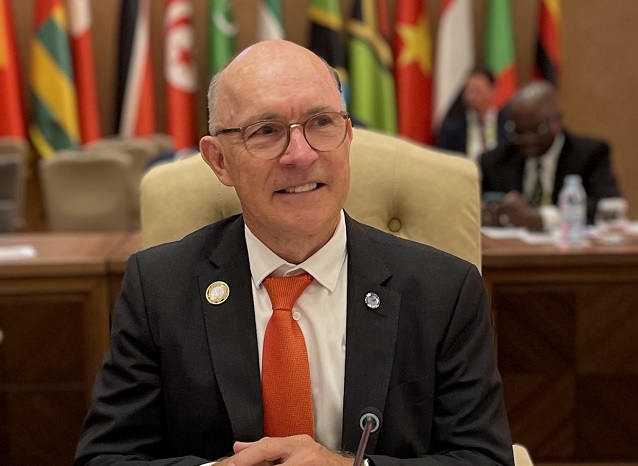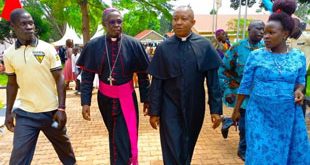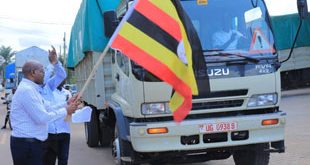
Kampala, Uganda | THE INDEPENDENT | The Executive Secretary of the Comprehensive Nuclear Test-Ban-Treaty (CTBT) Organization, Dr. Robert Floyd made his first visit to Uganda as he rallied countries against testing nuclear weapons.
Dr. Robert Floyd attended the opening of the 19th Summit of the Non-Aligned Movement (NAM). His attendance at the Summit in Uganda has been widely viewed as part of his wider campaign to strengthen the nuclear non-proliferation and disarmament architecture.
Non-Aligned Movement (NAM) has particularly played an important role in the Treaty’s negotiation in the Conference on Disarmament in Geneva and subsequent adoption by the UN General Assembly.
The Summit of Heads of State or Government of the Non-Aligned Movement is NAM’s highest decision-making authority, and its decisions are action-oriented. It normally focuses on political issues, including the advocacy of solutions to global economic and other problems.
The Summit being chaired by President Museveni comes amidst heightened tensions with the Russian invasion of Ukraine and the Israeli war in Gaza. Some of the countries involved in those insurgencies are yet to ratify the Nuclear-Test-Ban Treaty.
On October 18, 2023, the Russian parliament passed a bill to revoke its ratification of the Comprehensive Test Ban Treaty.
Uganda deposited its instrument of ratification of the Comprehensive Nuclear-Test-Ban Treaty with the Secretary-General of the United Nations on 14 March 2001.
Uganda became the second member of the East African Community, after Kenya, hosting an International Monitoring System (IMS) facility to ratify the treaty. Uganda’s monitoring system is located in Mbarara.
URN has information that Tanzania is another country in East Africa that hosts an International Monitoring System. The Comprehensive Test Ban Treaty, adopted in 1996, is the first international treaty to ban all nuclear tests. It has 187 states which have signed, and 178 which have ratified, but has not entered into force yet because of the failure of eight states, upon whose ratification the entry into force of the treaty depends: China, the Democratic People’s Republic of Korea, Egypt, India, Iran, Israel, Pakistan and the United States.
Uganda is one of the countries with massive deposits of uranium which is a key component of nuclear bombs. Globally, there remains a fear that uranium intended for commercial nuclear power might be diverted for use in weapons.
Uranium is a major source of fuel for commercial nuclear power or atomic energy. Uganda has insisted on exploiting those resources for peaceful application in planned nuclear power plants.
On Saturday, Dr. Robert Floyd was scheduled to visit the Directorate of Geological Surveys and Mines Department (DGSM) as part of his three-day visit to Uganda. Among the areas he was to visit was the National Data Center. He was guided around the facility by the State Minister for Minerals, Peter Lokeris, and Ag. Commissioner Geological Survey Department, Dr. Fred Tugume. The Comprehensive Nuclear-Test-Ban Treaty (CTBT) bans all nuclear explosions everywhere, by everyone, and for all time.
What has been the Progress with CTBT?
URN was part of an online briefing hosted by the UN to update journalists about the relevance of the Comprehensive Nuclear-Test-Ban Treaty (CTBT) and the progress since it was established in 1996. Dr. Robert Floyd said the use and proliferation of nuclear weapons is of greater concern now than for any time in recent history.
Despite the dark clouds, Dr. Floyd said the Comprehensive Nuclear-Test-Ban Treaty (CTBT) is making a significant contribution to global peace and security and disarmament architecture for the betterment of all global citizens.
“This century, only one country. Colleagues that is success. We are also building momentum to end nuclear testing,” he said.
Nuclear testing has had devastating humanitarian and environmental consequences around the world. Dr. Floyd revealed that in the past two years, nine countries have committed to the test ban treaty in a new way by signing or ratifying the treaty.
The most recent ratification was Sir Lanka in South Asia. One hundred and seventy-eight countries had ratified the treaty by the end of 2023, while 197 had signed it. Just nine countries in the World were yet to sign the Treaty.
“There is a global movement of governments standing up to say we will not repeat the mistakes of the past. We will not accept a future that includes nuclear tests” Revealed Dr. Robert Floyd.
Africa plays an important role in the worldwide quest to ban nuclear weapon testing. Of the region’s 54 States, 54 have signed and ratified. Somalia was among the last countries in Africa to ratify the treaty.
The CTBT is tasked with building and maintaining the Treaty’s verification regime. Africa plays a key role in CTBT verification as the region with the largest number of States hosting International Monitoring System (IMS) facilities. Once complete, there will be 38 IMS facilities located in 24 African States – 21 seismic stations, 9 infrasound stations, 7 radionuclide stations and 1 radionuclide laboratory.
***********
URN
 The Independent Uganda: You get the Truth we Pay the Price
The Independent Uganda: You get the Truth we Pay the Price


